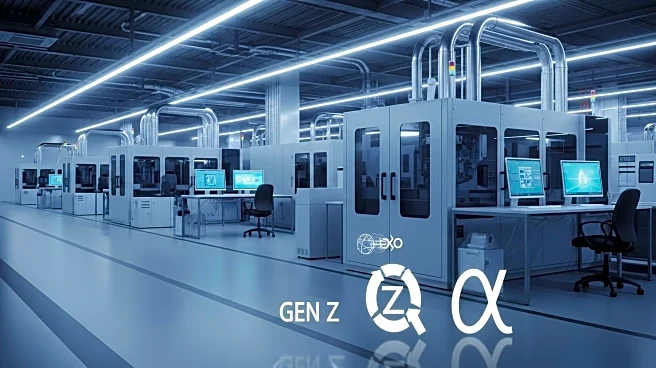What's Happening?
The global industry is experiencing a significant labor shortage, with a projected shortfall of over eight million workers by 2030. This crisis is prompting companies to focus on attracting younger generations, specifically Gen Z and Gen Alpha, to fill the gap. The industry is undergoing a transformation driven by digital technologies such as artificial intelligence (AI), the Internet of Things (IoT), and big data, which are making factories cleaner, safer, and more efficient. These advancements require a workforce skilled in data science, AI, robotics, cybersecurity, and cloud computing. The challenge lies in appealing to digital-native generations who are familiar with these technologies and motivated by meaningful work that contributes to sustainability and innovation.
Why It's Important?
The labor crisis in the global industry has significant implications for the U.S. economy and its industrial sectors. As industries strive to achieve net-zero greenhouse gas emissions, the need for a skilled workforce becomes critical. Gen Z and Gen Alpha, known for their technological prowess and desire for meaningful work, are seen as key to driving this transition. Their involvement could lead to increased innovation and sustainability in manufacturing, aligning with broader environmental goals. However, industries must effectively communicate the benefits and opportunities of industrial work to attract these younger workers, who are often drawn to digital platforms and influencers.
What's Next?
To address the labor shortage and attract younger generations, industries are expected to enhance their storytelling and engagement strategies. This includes leveraging social media platforms and influencers to highlight the positive changes in industrial work environments. Additionally, companies may need to collaborate with educational institutions to develop training programs that align with the skills required in modern manufacturing. As industries adapt to these changes, they will likely focus on creating work environments that emphasize sustainability, innovation, and social responsibility, which are key motivators for Gen Z and Gen Alpha.
Beyond the Headlines
The shift towards engaging younger generations in the workforce also raises ethical and cultural considerations. Industries must ensure that their efforts to attract young talent do not exploit their digital savviness or overlook the need for fair labor practices. Furthermore, the emphasis on sustainability and innovation could lead to long-term shifts in how industries operate, potentially setting new standards for environmental responsibility and social awareness in the corporate world.










